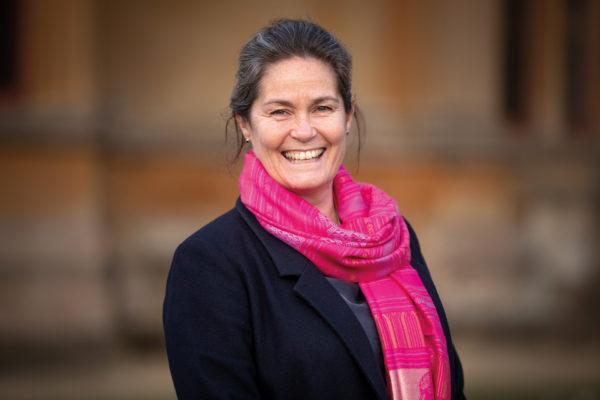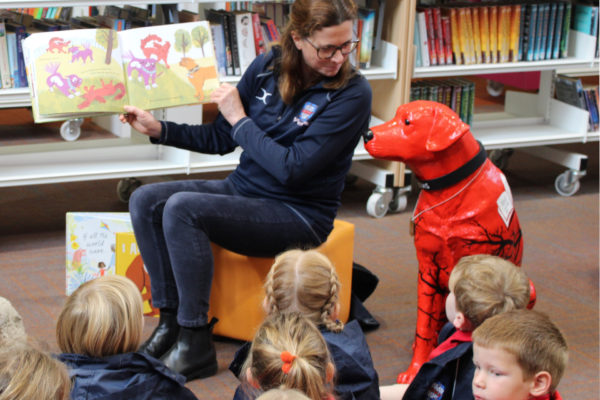How Is AI Rewriting Education?
By
2 years ago
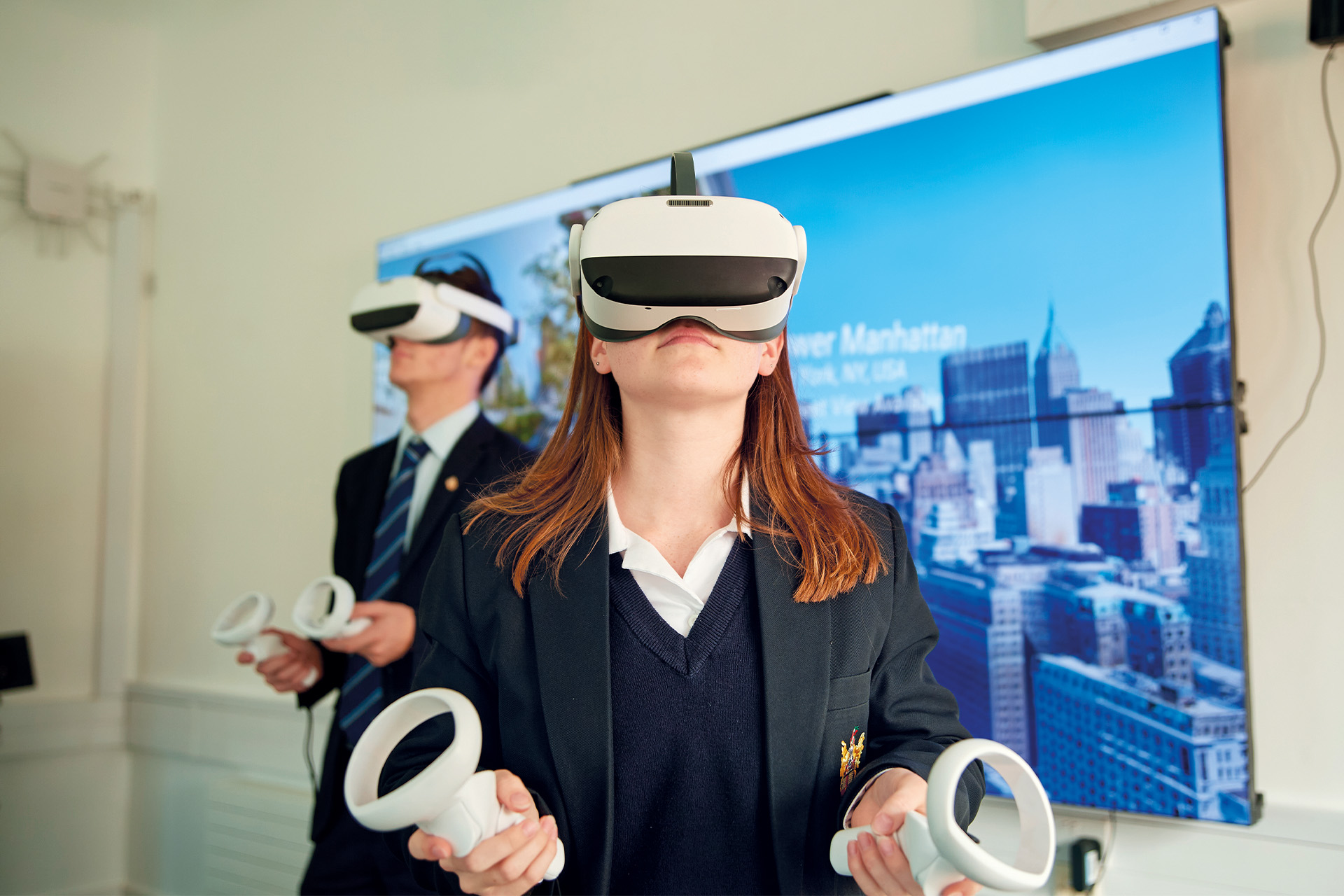
Essays by chatbots, lessons carried out in the Metaverse… Thea Jourdan investigates the latest changes to the classroom
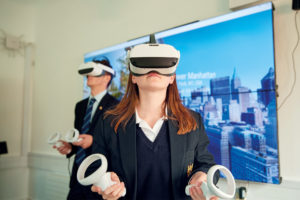
Learning with virtual reality technology at The Leys School
Artificial intelligence is revolutionising education – and schools are evolving at lightning speed to keep up with the new technology. ChatGPT, which has gained a massive following since its launch late last year, is one of the leading chatbots which has made its way into the heart of the classroom, (when it’s not banned) causing consternation and excitement in equal measure. Put simply, this chatbot, which works like supercharged predictive text putting words in order based on statistical probability, can write CVs, solve science and maths problems, and produce a working computer code. It’s also churning out readable essays in seconds, which has led to concerns that unsupervised homework assignments will become a thing of the past. Recent research conducted by BCS, the chartered institute for IT, found that 62 percent of professionals believe that chatbots like ChatGPT will make it harder to mark students’ work fairly.
While ChatGPT is restricted to language, dozens of other AI apps can produce videos, sounds and images. All you have to do is ask a question or provide a prompt.
But is AI a threat or an opportunity to educators and their students? Certainly, there is no going back. AI has already dramatically altered the way we work, shop and play. Voice recognition, online searches, ‘smart’ home devices – all have their roots in AI. Yet it’s still concerning when Elon Musk, who co-founded Open AI, the research lab responsible for ChatGPT, and others recently called for a moratorium for AI labs to observe for at least six months as they race to produce ever more powerful AI engines. Musk thinks that the capabilities and dangers of the technology can be properly studied and mitigated. The UK’s Department of Education recently published its own statement on the issue which was broadly welcoming. ‘When used appropriately, technology (including generative AI), has the potential to reduce workload across the education sector, and free up teachers’ time, allowing them to focus on delivering excellent teaching. Schools, colleges and universities, as well as awarding organisations, need to continue to take reasonable steps where applicable to prevent malpractice, including malpractice involving use of generative AI and other emerging technologies.’
So how are schools finding a happy medium? At Institut auf dem Rosenberg, an international boarding school located in St Gallen in Switzerland, students as young as eight are being encouraged to use AI as a tool in the classroom both as a learning aid and to enlarge their viewpoint. ‘Instead of fearing this powerful technology, we should embrace it and teach students how to harness it responsibly,’ says Anita Gademann, the school’s director and head of innovation. ‘AI presents enormous opportunities as a tool of democratisation and progress for mankind.’
Gademann adds: ‘The important thing is not to fear using AI and we need to believe in human agency. We have created AI and now we have to govern it. Are we going to help shape this or remain on the outside?’ Prior to its launch to the general public, Gademann was part of the early access programme of Open AI’s DALL·E AI Artist and GPT-3. Since then, teachers, known as ‘artisans’ at Rosenberg, have already spent hours testing and exploring AI’s ability to answer student assignments and exam questions across all subject areas.
Rosenberg students are also taught the shortcomings of AI tools which can produce unreliable information. In recent history classes for example, students were asked to use the AI app DALL-E AI Artist to create images of medieval life, and then critique the images looking at elements of the computer-generated images that were historically inaccurate. ‘It really helped them to look more deeply at medieval life in an interesting way,’ says Gademann.
ChatGPT is easy to use but is a creative writing tool, she says, and is not particularly reliable when it comes to data and sources. ‘We judge AI tools with an expectation that they can do anything but different AI tools have different skills. There’s also this caveat that students need to know which AI tools to reach for.’
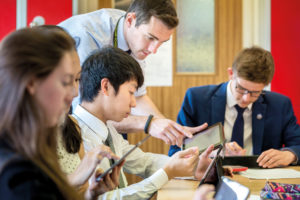
Caterham School pupils using technology in their lessons
Professor Sir Nigel Shadbolt, professor of ethics in the Department of Computer Science, University of Oxford, is firmly on the side of opportunity – with caveats. Speaking recently on a BBC Radio 4 documentary By ChatGPT, he said: ‘One of the guiding ethical principles I always use: a thing should say what it is and be what it says. We will definitely need to regulate the use in exam conditions or in formal assessment conditions but in other areas we can see these tools as enhancing or enriching a learning experience.’
Dr Matt Glanville, Head of Assessment Principles and Practice at the IB, released a statement saying that the board would allow the use of AI, as long as software was credited. ‘The IB believes that artificial intelligence (AI) technology will become part of our everyday lives, says Glanville, ‘like spell checkers, translation software and calculators. We, therefore, need to adapt and transform our educational programmes and assessment practices so that students can use these new AI tools ethically and effectively. The IB is not going to ban the use of such software but will work with schools to help them support their students on how to use these tools ethically in line with our principles of academic integrity.’
Just in case, Google and others have already developed software that can detect AI output, including essays, but the race to outwit the arbitrators has also begun. Instagram is full of videos instructing students on how they can use other AI apps, including Quillbot, to rephrase their ChatGPT offerings so that they avoid detection.
At Haileybury, staff believe – if embraced effectively and responsibly – AI can bolster independent thought and critical thinking. ‘We continually assess our curriculum to ensure it equips pupils to thrive in the modern world,’ says Stephen Campbell, Deputy Head (Academic) at Haileybury.
‘Currently, we offer a bespoke AI course in Year 9 to engage pupils in Computer Science, educate them on the ethical debate concerning AI and help them develop analytical skills. Our sixth form also studies the International Baccalaureate where ChatGPT can be used to support essay writing.’
Jonnie Noakes, Director of Teaching and Learning at Eton College in Windsor, says that the school aims to teach the boys how to use AI responsibly, but the technology may lead to some unwanted outcomes. ‘On the down side it has the potential to ‘steal the struggle’ from students,’ Nokes says. ‘It also exerts a gravitational pull towards academic mediocrity. There is potential for biases and misinformation deriving from bias in the dataset on which it has been trained. But these problems can be turned to benefits by having pupils identify bias and by fact-checking information, which are central elements of critical thinking (and increasingly relevant in a world of deep fake videos, misinformation bots and so on). Also on the up side, legitimate uses of ChatGPT by pupils include research, brainstorming, and providing a new perspective on a topic.’
Teachers could benefit from AI tools in the classroom too, not least from new AI marking tools. For example, at Eton, IGCSE boys have been trialling a new AI platform called Progressay, which claims that it can mark English Literature essays more accurately than examiners. Noakes, who is also an English teacher, says he was initially sceptical. ‘So much of the study of literature is about an understanding of human experience, an appreciation of beauty, an awareness of the nuance of language, and an imaginative grasp of irony and metaphor. AI aims to simulate human responses, but it cannot be moved by poetry. What use could it be for marking English Literature essays?’
Yet the boys tested Progessay, using their own essays on Othello, alongside traditional human marking, and found that it did a ‘good job’. Noakes explains: ‘The marks awarded by the platform across all the essays were on average within 1½ marks (out of 25) of my marks. It turns out that this is closer than between two experienced examiners.’
At Caterham School in Surrey, the teachers are already using AI to mark work and carve out more time for lesson planning. ‘AI enables teachers to spend their time making meaningful interventions,’ explains Headmaster Ceri Jones. ‘AI can also help with providing feedback on basic issues such as grammar, factual inaccuracies etc – enabling teachers to focus on issues of understanding and cognition.’ He says ‘Using AI to give feedback and guidance and ideas to pupils however, is a very easy and powerful opportunity for teachers right now. It will always be important for teachers to physically mark some pupil work so that they understand of what they are capable of.’
At Caterham, teachers have used AI to create bespoke extension or support materials for individualised learning, to brainstorm schemes of work spanning and linking multiple curriculum areas and to create resources and scaffolds to assist pupils in their learning, says Jones.

Pupils at Institut auf dem Rosenberg learning about robotics technology
At Merchant Taylors’ School, in London, boys in Year 9 are going a step further and building their own AI chatbots. Laura Smith, Director of Teaching and Learning, explains: ‘AI is used by boys in Year 9 to create simple chat bots, which introduce the idea of how AI can take on tasks.’
Graham Macleod, Head of Academic Computing at Merchant Taylors’ School, says that the new AI revolution feels like the ‘pocket calculator moment for the humanities.’ He is impressed by how AI is revolutionising coding. ‘There have been significant AI-driven advances in the tools that the pupils use. The obvious example of this is the programming editor (Visual Studio) that we use for coding. The 2022 version which came out last year was a step change, offering sensible and helpful suggestions about how to code. It was so impressive that we rushed out its installation ahead of last year’s exams, because it gave the pupils a significant advantage.’
Oliver Peck, the Director of Studies at The Leys School in Cambridge agrees that AI is an opportunity not to be missed: ‘With technological advancement, for as long as there has been compulsory schooling, there have been new and unimaginable career pathways for each generation. The advent of AI will be no different than the arrival of the printing press or factory line in that new jobs and careers will be created.’
Peck adds: ‘Our job, as educators, is to prepare pupils for this changing landscape by teaching them how to learn the new knowledge and skills which will be required of them and supporting them in being resilient enough to develop the aptitudes required in such an environment.’
The immersive metaverse, as envisaged by Mark Zuckerberg among others, is also likely to become a reality in the years to come. Minerva’s Virtual Academy is an online independent school for home-schooled students aged 11-18, delivering learning online. ‘We are a new vision for education in the 21st century, combining the best of independent schooling with homeschooling and delivering it all online,’ says Headmaster Lawrence Tubb. Students learn at their own pace through a mixture of live group lessons and online modules, all with the support and care of a personal mentor.
Deputy Head Academic, Jack Child, adds ‘Our students don’t learn in the metaverse – but we are exploring how this might bring classes closer together across countries. It will also allow us to plan and create very interactive lessons where we can immerse our students in different environments; this will serve to enrich their learning.’
Tom Rogerson, Headmaster at Cottesmore Prep School, believes the future lies in augmented reality. ‘Virtual reality – sorry to say, virtual reality enthusiasts – is a bit rubbish, because all it is is like watching a screen without the sides.
‘Augmented reality, though – the real awesome holograms, realistic holograms, augmented reality – that is, I think, where it’s going to get super, super exciting, because you can be outside, you can have the sun on your face, you can be doing stuff, you can be in the Battle of Hastings on the cricket pitch.’
AI is ‘ubiquitous’ at Cottesmore where the school has bought into many platforms including Century Tech, GL Assessment, Languagenut, Atom Learning, EducationCity, Planet BOFA and Mangahigh. ‘Many of these applications use adaptive testing which adjusts to the characteristics of the user, varying the contents’ difficulty in reaction to responses. The applications also create learning maps to highlight areas on which the pupil needs to work,’ says Rogerson.
As for virtual reality classrooms, Anita Gademann, says ‘bring it on’ – but emphasises excellent teachers will always have the pre-eminent place in education, confirming ‘Our artisan teachers are our unique selling point.’ And real-world experiences are hard to beat. Pupils at Rosenberg have their own 3D-printed Space Habitat, designed by them in collaboration with SAGA Space Architects, which allows them to feel what it’s like to be an astronaut on a mission – minus the zero gravity. The space-optimised structure consists of lab research and workshop facilities, areas for recreation and entertainment as well as for privacy and rest.
When you have real-life classroom assets like this, Gademann points out, a virtual tour wearing a headset just doesn’t quite measure up.





